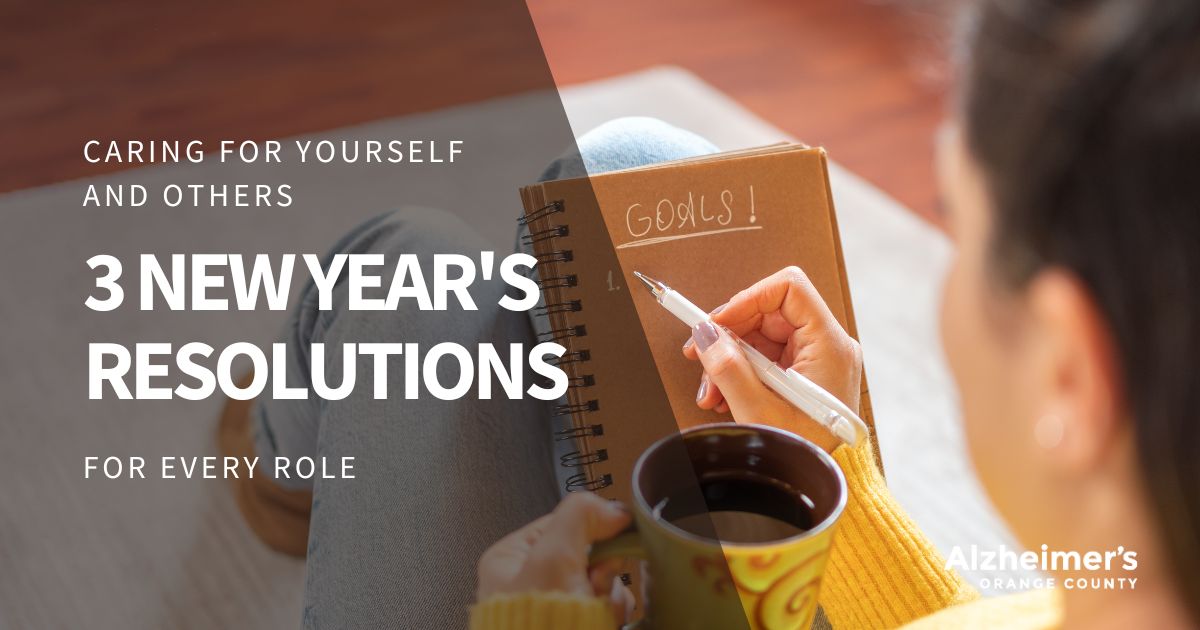Improve how you care for yourself and for others with these New Year’s resolutions for care partners, healthcare professionals, and anyone looking to make positive changes in their lives and well-being.
1) Create and Maintain a Self Care Routine
Anyone that’s cared for or is caring for someone with Alzheimer’s disease or some other form of dementia can tell you it’s a challenging journey. That’s why taking care of yourself —physically and mentally—is one of the most important things you can do as a caregiver. Although you may feel like there’s not enough time, struggle with guilt over taking a break or simply don’t prioritize self-care, it’s essential to carve out time for yourself.
Remember, self-care is not only good for you, it’s good for the person you’re caring for. How so? When you are well-rested, calm and happy, you can provide better care and support for your loved one. Otherwise, you risk heightened stress and potential health issues, which can ultimately lead to burnout.
Think of it this way: on an airplane, passengers are instructed to put on their oxygen masks first before helping others. The same principle applies to caregiving—you need to take care of yourself to effectively care for your loved one.
Try this: Create a self-care routine based on things you can enjoy doing and stick to it. Join a support group to find a space to share experiences and find encouragement alongside others like you.
Resource spotlight: Adult day centers—like Healthy Aging Center:Acacia—are a great way to get daytime assistance that gives you a break and provides the care your loved one needs in a safe, enriching environment. Learn more.
2) Get Educated
Understanding dementia and healthy aging topics benefits everyone—not just older adults or those directly affected by the condition. Healthcare professionals and the general public can enhance their knowledge of key issues impacting a significant number of Orange County residents and learn how to provide better support and care.
Alzheimer’s Orange County (AlzOC) offers weekly education classes available to the community at no cost to help others understand the basics of dementia, like how to communicate with people experiencing memory loss and the differences between Alzheimer’s disease and dementia. Additional classes about brain health and other healthy aging topics equip attendees with a better understanding of safety, legal and planning issues, how toreduce your risk of cognitive decline and other related topics.
As part of their curriculum AlzOC also offers CE credit via a monthly webinar for a small fee. Those webinars are available for free for anyone not taking it for CE credit.
Try this: Review our education calendar for upcoming classes and register for a class that you find interesting.
3) Make Brain Health a Priority
No matter your age or role, everyone can benefit from prioritizing brain health. Research suggests that lifestyle factors—such as a nutritious diet, regular exercise, social engagement, quality sleep, managing medical conditions, and pursuing mentally stimulating activities—may reduce the risk of cognitive decline and Alzheimer’s disease.
So how you can get started? Consider attending one of our brain health classes that are available online and throughout Orange County. Learn about the importance of sleep, the role of nutrition in brain health, the six pillars of brain health and more about how to live a healthy-brain lifestyle. See upcoming brain health classes here.
Concerned about possible changes in cognition? You can schedule a Mind Check memory screening available for free. Call our Helpline at 844-373-4400 to learn more and schedule your appointment.
Try this: Attend a brain health class and set three goals for yourself in areas where you think you need to improve on to cultivate a healthy-brain lifestyle.
Walk4ALZ 2025
March 15, 2025 | Angel Stadium
Join us for our biggest annual event, where people of all ages unite to raise funds and awareness for those affected by Alzheimer’s or other types of dementia. Walk, donate, and volunteer to bring hope, support care, and ensure no one in our community faces this disease alone. LEARN MORE.
ADDITIONAL READING
Alzheimer’s Caregiving: Caring for Yourself
Check out more practical tips on how you can care for yourself, how to ask help from others and what resources are available to make it easier. Read more.
Live Online Webinars
Check out the latest live webinar offering. CE credit is available. Learn more.
The 6 Pillars of Brain Health
Review the six pillars of brain health topic sheet for practical suggestions and tips you can promote good brain health in your life. Read more.


